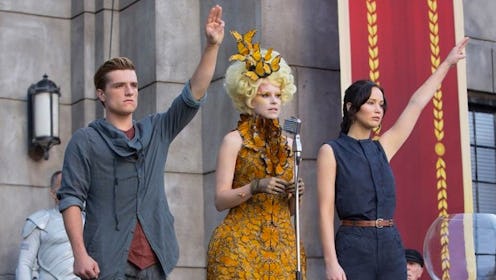Entertainment
The Politics of 'Catching Fire'

There is a reason I will go into metaphorical and often wordy battle in defense of the Hunger Games series. That reason is not Katniss Everdeen's love triangle or her side-braid, it's not even my deep-seated love of YA literature or the fact that I've got a giant sweet spot for a good hero's journey. No, my rabid defense of The Hunger Games — and more recently of its second adaptation, Catching Fire — comes from a deeply Brechtian place. Because The Hunger Games: Catching Fire is all about politics when it comes down to it — Donald Sutherland, who plays dictator President Snow in the films, even said that he hopes the films "stir up a revolution." And that is incredibly important in a lot of ways.
To start this off with a distinct air of pretentiousness, here is what Bertolt Brecht famously said on the matter:
Art is not a mirror held up to reality,but a hammer with which to shape it.
The Hunger Games series, perhaps more than any other young adult books that I can think of — even Harry Potter, whose allegories have inspired national charity organizations that have done real-world good — takes the political at its forefront. Politics aren't just a flavor thrown into the story of Panem — it is, like the themes of death and love were in Harry Potter, embedded in virtually every page.
And so why shouldn't Catching Fire, which has been doing gangbusters at the box office, fulfill its own theme and move past just being a means of capitalist gain and into the role of inspiring real-life action?
It is hard to leave a Hunger Games film without being struck by the ways in which Katniss' world resembles our own. That's part of what has made the endless parade of Hunger Games marketing tie-ins seem so ridiculous — even when they were commenting on the irony, you couldn't help but see that those aspects of the business promoting the series played right into Capitol habits. It's not a huge leap from there to realize that, in our world, the Districts do exist, they're just intermixed with the Capitol.
It is through this that, in my opinion, The Hunger Games — as books and as films — transcends the bounds of most blockbuster franchises to become some form of art. As a friend of mine wrote in a musing on storytelling a couple years back, "Brecht theorized that it was politically immoral to give the audience catharsis, and instead necessary to leave them with a feeling of unease— the opposite— so that they would be provoked into making real change outside of the theater."
And that, hopefully is what The Hunger Games — and, right now, Catching Fire, can do. As Variety's Peter Debruge wrote in his recent review, Catching Fire "[leaves] fans riled and ready to storm the castle." So why not use that energy not just to spend money on seeing the movie five more times, but to raise awareness on income disparity, the nuances of poverty, and the ways in which people in power (from the government to the people running the corporations that run our lives) are using or abusing their power? That is art at its most powerful.
While I personally hope that it's not groups like the Tea Party who (misguidedly and in a gross misreading of the text) adapt Katniss' image and quest for their purposes, I do hope someone in the real world does. Because, while it requires a momentum that is incredibly rare to find in the media, I do believe that if anything has the power Catching Fire does.
In other words, anyone else wanna go get a Mockingjay tattoo with me?